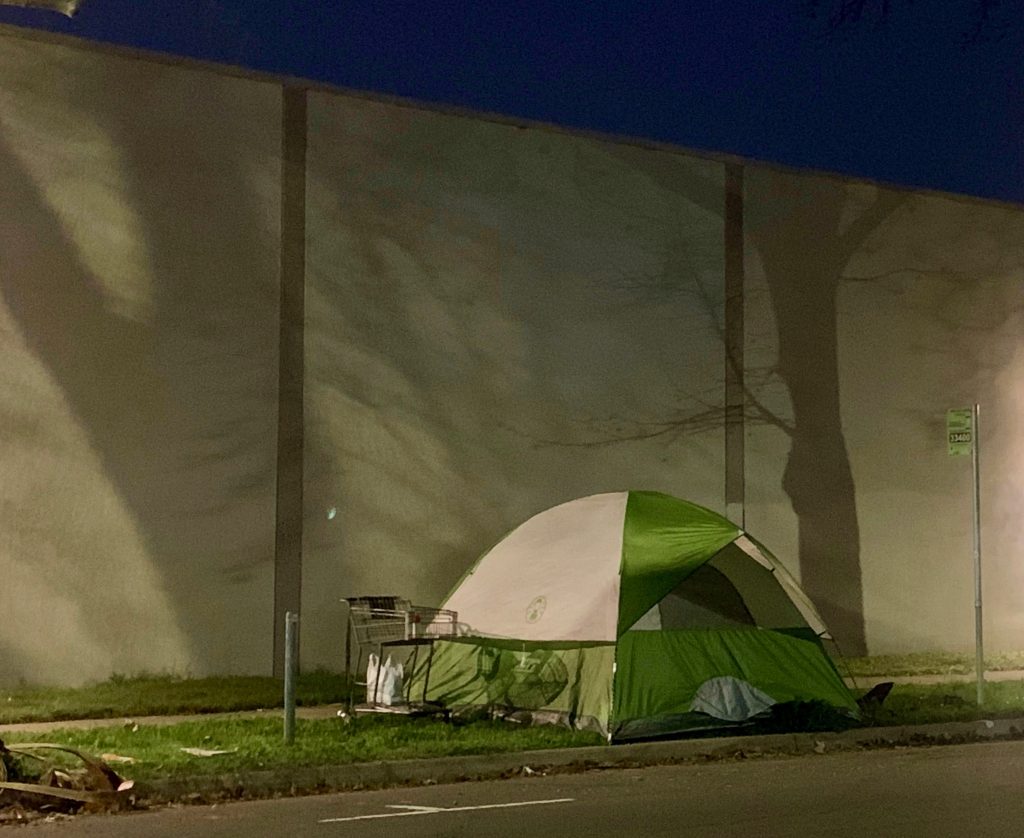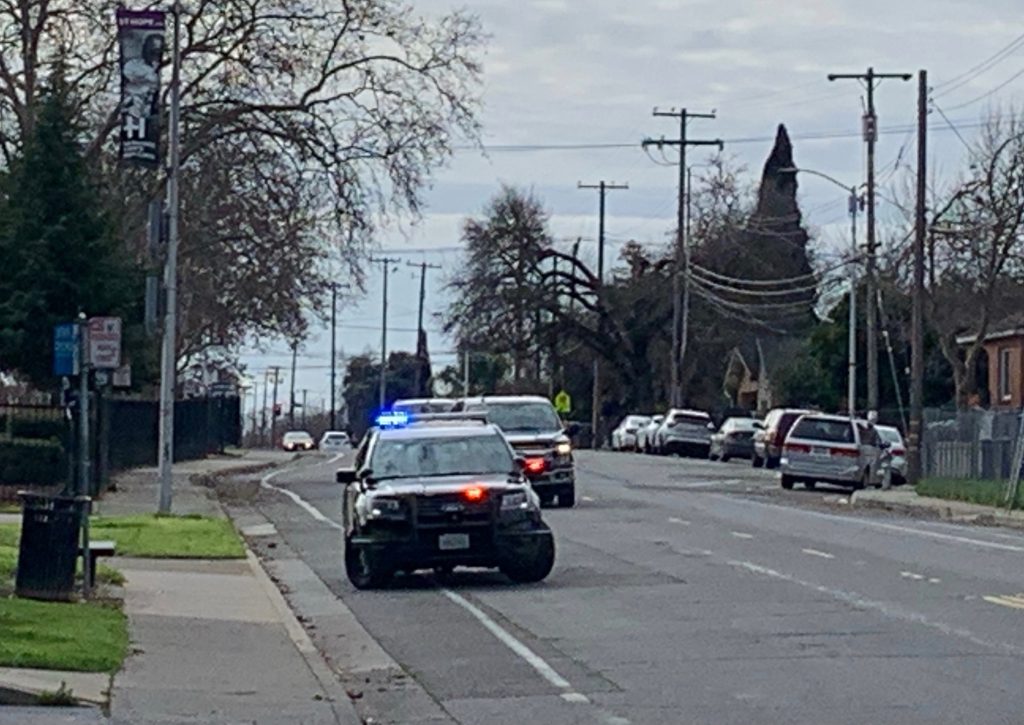By Scott Thomas Anderson
The lines for Sacramento’s District 4 have been redrawn and local politicos are waiting to see what that means for representation at City Hall. Its dimensions now encompass everything from the downtown heartbeat of state government, to historic enclaves like Second Japantown and Little Italy. But perhaps the biggest question on everyone’s minds involves how its newly absorbed neighborhoods of East Sacramento will vote on March 5.
The frontrunners in the race, current councilwoman Katie Valenzuela and veteran city planning commissioner Phil Pluckebaum, are weighing that X-factor more than anyone; and both candidates say that voters across the district are speaking up about their concerns.
“There’s only platform – people experiencing homelessness,” Pluckebaum observes. “After that, you can talk about affordable housing and public safety, but it’s all related to people experiencing homelessness, ultimately.”
Valenzuela says the feedback she’s getting involves how the homeless challenge and housing crisis are related.
“The biggest thing is affordable housing, we hear this all the time,” Valenzuela reflects. “Sac Steps Forward told us that for every one person that we’re housing, three more people are losing their housing. We are not moving upstream to address some of the root causes of why people are losing their housing. The data on this is super obvious. The biggest research project on this topic ever done in the country, from UCSF, included data from Sacramento, and said that in a lot of cases – not a hundred percent – but in a lot cases, having a more affordable unit, or having a one-time emergency fund, would have kept these people in their houses.”
Tents on the streets. Eviction notices in door slots. These images are dominating the contest for Sacramento’s urban core. Valenzuela and Pluckebaum are making their cases, though doing so in district boundaries that neither anticipated campaigning in.
“The plan was to run in District 3, but now we live in District 4,” Pluckebaum acknowledges of recent changes to Sacramento’s voting landscape.
Pluckebaum has been involved in area politics for nearly 20 years, starting with a grassroots school restructuring campaign back in 2007. Over the last eight years, he’s gotten familiar with the inner workings of City Hall from the vantage point of a planning commissioner. Pluckebaum thinks that experience, coupled with his background as a project manager at U.C. Davis Health, puts him in a good position to get results.
“That skill set, helping a sponsor negotiate for resources against competing priorities I think is pretty applicable to the work that we do at the city,” Pluckebaum notes. “From my point of view, aligning the budget and the priorities is pretty similar … I never planned to run against an incumbent. I never planned to run in a district shaped like this. But that’s just what it is, and the desire to serve never left me.”
Valenzuela, the daughter of a Vietnam veteran who spent years working with neighborhood associations around Oak Park, previously ousted then-District 4 councilman and current mayoral candidate Steve Hansen for her seat on the dais. It was an electoral upset that few media figures and policy wonks thought was possible. But Valenzuela knows she pulled off the feat in a district that was ground-zero for homelessness and the housing crisis. Now, having campaigned along avenues that are newer to her, she believes tensions around housing insecurity and pain on the streets are being felt everywhere.
“What I want to emphasize is that we are making progress,” Valenzuela says. “We’ve never been this close to getting inclusionary housing back. We’ve never been this close to having a council who will actually look at tenant displacement issues. We’re one vote away on some of these issues. And with some of them, we have the votes. I get peoples’ frustration; but what I think some people are failing to grasp is that we are turning a very big tsunami back in a different direction.”
The Two Hs

Valenzuela’s mention of getting ‘inclusionary housing back’ is a reference to a policy that the Sacramento City Council and Board of Supervisors both respectively abandoned between 2014 and 2015. That rule mandated that developers to build 15% of any residential project as affordable units in order to get approval, no matter how flashy or upscale they wanted to make a project – or how may wealthy renters they wanted to market to.
But then city and county leaders, at the behest of developers who happened to be writing big checks to their campaigns, ditched that safeguard for working people, allowing builders instead to pay a fire sale-priced fee against every square-foot unit of their project into an affordable housing trust fund. That trust fund has since produced very little affordable housing, and review after review has determined the policy shift was a disaster: Mayor Darrel Steinberg, who arrived at City Hall during the fall-out from it, admitted as much in 2020. With support from fellow councilwoman Mai Vang, Valenzuela started pushing city leadership to bring back inclusionary housing. Now, as the race heats up, she admits that reclaiming it – along with several other pro-tenant, pro-low-income earner housing policies – proved an uphill battle. But, she adds, the picture improved for her with the 2022 elections.
“For the longest time we didn’t have the votes,” Valenzuela explains. “So, I always emphasize to people that the council did change pretty significantly in 2022; and we now have two more very direct pro-housing, pro-tenant members on it (Katie Maple and Karina Talamantes). We might not agree on everything, but we agree on this. And that makes me excited that we’re finally in striking distance for some of these policies.”
Pluckebaum generally agrees that affordability challenges are causing members of the working poor to fall into homelessness, as well as greatly affecting the quality of life for those who don’t.
“The population experiencing homelessness is as diverse as the overall population,” Pluckebaum says. “Folks come to being unhoused from all kinds of different places for all kinds of different reasons. There’s a pretty robust population of people within that ten thousand [living outdoors] that we have – which we’re about to find out is a much higher number – that are working jobs, or two jobs, or are in a family, and each are working for minimum wage, and that combined income is not enough. Valley Vision put out a number not that long ago that said that the average combined income for a family had to be something like $35 or $36 an hour just to achieve housing in the region … That’s two jobs and a side hustle with no margin of error for something like a car breaking down or a medical emergency.”
Pluckebaum thinks that the city needs to be laser-focused on incentivizing and accommodating more housing units getting built, and doing whatever it can to stabilize market prices as quickly as possible. He knows the city and county are “so far behind” on the number of affordable units they need. Pluckebaum is also open to creating a special fund that could help tenants facing one-time emergencies if they’re at a tipping point in their rental situation.
“It’s been shown in other places that those kinds relatively low-cost interventions can sometimes make all the difference,” he adds.
Enforcement and policing

Valenzuela feels one of the biggest misconceptions about her floating around the Twitter-verse is that she’s indifferent to public safety concerns or has no lines of communication with police. The councilwoman doesn’t deny that she has pushed for more transparency around the police department’s spending, though she nonetheless meets with its leadership on a regular basis. She also says that she understands safety concerns on a personal level, especially after there was a credible death threat made against her life in 2022.
Valenzuela’s public safety stance stresses funding interventions in community violence, including anti-gang youth initiatives and supporting violence disruptors in neighborhoods. She also wants to put resources into professional interventions in mental health and substance abuse. Valenzuela says she’s already fought for $5 million in spending on gang prevention, referencing a report in 2019 that suggested similar investments paid big dividends in the form of Sacramento County having no child homicides for 12 months.
On the one-year anniversary of the K Street mass-shooting, Valenzuela was the only elected official from City Hall who showed up to the memorial service and stood with the family members of the victims as they grieved.
“Public safety is a huge priority for me: I guess that’s one of the things that I find interesting about this council is that I don’t think we all define public safety in the same way,” Valenzuela remarks. “Even though the council had a whole discussion about redefining public safety, I think most people just see it as how many calls are we responding to, and how quickly do we get there. To me, a safer community is one where there is less calls because we’ve invested in strategies that we know will address that. Most violence isn’t random, even if it’s someone with mental illness, that again was a predictable outcome that they would hurt somebody they don’t know.”
But Pluckebaum’s diagnosis of public safety concerns includes evaluating the shape that the Sacramento Police Department is in. He says its stats and numbers paint a picture of a stressed-out agency that’s struggling to fill its ranks or recruit top talent, all of which impacts police response time and quality of service. Pluckebaum implies that he would have a less-adversarial relationship with its commanders and officers.
“We can’t even get recruits, much less lateral transfers,” Pluckebaum says. “They keep cancelling our [Police Officer Standards and Training] academies.”
Pluckebaum points to the struggles of Downtown-area businesses, which have routinely been dealing unwell individuals smashing business windows, screaming at customers and – in numerous documented cases – assaulting employees who work in those operations. Company sources with Starbucks told Sacramento News & Review that such ongoing problems were the reason that its café on Broadway Avenue was permanently closed; and in November the manager of Ruhstaller taproom on K Street penned an open letter saying that similar conditions had made the historic avenue “dirty, dangerous and dead.”
Pluckebaum argues that constant broken doors and windows, or tents pitched directly in front of business entrances, or patrons having deranged things screamed at them while they’re walking into a restaurant, have to start being mitigated in a serious way.
“That kind of low-level crime, that kind of nuance crime, we just don’t have any staff for that with the number of vacancies we have in our police department right now,” Pluckebaum contends. “We can’t out-spend our neighbors [for paying officers], so we have to make this a place where it’s desirable to work. That starts with treating folks with respect.”
The commissioner also thinks working with the police goes hand-in-hand with encouraging more enforcement around homeless encampments that are impacting neighborhoods and small businesses. He calls his strategy “compassionate enforcement.” He thinks it’s obvious that a majority of voters want something like it at this point.
“Outside of those working people who are struggling to stay in their housing, there’s also a very visible population of people that are experiencing drug and alcohol addiction and/or mental illness; and those are the people that are really hard to reach,” Pluckebaum observes. “Hopefully if Prop. 1 passes this March we’ll have some resources to bring back to that public health and mental health space … Folks are looking for real, genuine care and compassion – most folks, not everyone – but most are also looking for clean and safe streets. They want to have people given a place to be that’s not the street, and then an insistence that’s enforced – that they will not continue to camp on our sidewalks and in parkways.”
He adds, “No one is really trying to criminalize [homelessness], and jail is not how we’re going to get us there –and it’s too expensive – but for the folks who are going to resist the offers of help that we have, there has to be some consequence eventually. You know, you can’t just sleep here forever. At the end of the rainbow, there needs to be some incentive for them to comply.”
Campaign funding

Similar to our coverage of the Sacramento mayor’s race, we reviewed the official campaign financial disclosures for the District 4 race. The following review is meant to be a contextual tool that voters can add into their broader consideration of each candidates’ platform.
According to official filings, Pluckebaum’s largest source of funding was individual and small dollar donors, who contributed more than $63,335 to his cause. That was followed closely by real estate and property management interests, who put more than $59,349 into Pluckebaum’s campaign. Construction companies and building trade unions combined for his third largest source of funding, adding some $28,625 to his coffers. Pluckebaum’s fourth largest source of support was area attorneys, who together contributed more than $21,250. Developers were the commissioner’s fifth sweet spot for fundraising, chipping in more than $15,399. Sacramento-area small businesses were Pluckebaum’s sixth best source of support, contributing more than $12,850. A category that we organized as ‘individuals who work in marketing, public relations and political consulting firms’ equaled Pluckebaum’s seventh top funding source, putting in more than $10,780. The Sacramento Police Officers Association contributed $6,800 to Pluckebaum’s hopes, and the Sacramento Metro Chamber of Commerce wrote a check for $6,800 as well. Those totals were followed by a category we organized as ‘the Tech and telecommunications industry and associated PACs,’ which added another $2,550 to Plukebaum’s war chest.
Pluckebaum has made no secret that he’s talking to local commerce leaders, as well as some of the beloved small businesses recently forced to close – and others on the brink of closing.
“I want to make this to be a place that’s vibrant and desirable,” he notes, “and the kind of place where my family wants to continue to be, and that our kids want to come back to.”
Official filings show Valenzuela also found her largest source of campaign funding in individual and small dollar donors, who contributed more than $91,278 towards her re-election. Her second-best source of funding was contributions from other elected officials or political candidates, who sent more than $10,750 in support her way. The category we organized as ‘construction companies and building trade unions’ equaled her third highest source of support, those groups donating more than $7,800, mostly in the form of several unions coming in behind her. Sacramento-area attorneys made up Valenzuela’s fourth highest donor category: They collectively put more than $7,000 into her campaign. Her fifth highest contribution line came from a single source, the Sacramento Area Firefighters union Local 522, who wrote a check for $6,800. Regional gambling interests ranked as Valenzuela’s sixth top contributor source, chipping in some $6,150. Her seventh top contribution category was the one that we organized as ‘individuals who work in marketing, public relations and political consulting firms,’ which contributed more than $5,723. Beyond that, Valenzuela received as $2,050 contribution from SEUI Local 1021; a $2,050 contribution from the Sacramento Central Labor Council; $1,800 from the National Union of Healthcare Workers; and roughly $1,250, collectively, from Sacramento-area small businesses.
Records indicate that several developers attempted to contribute to Valenzuela’s campaign, but she returned those funds.
Valenzuela admits that, tactically, it’s not easy to walk away from big funders; but she says she’s remained firm in her convictions.
“I’m still not taking developer donations or any fossil fuel or corporate money,” she stresses. “I’ve had multiple developers actually try to max-out donations.”
With a chuckle, she adds, “It’s hard to look at the money in your account and say, ‘Sorry, I need to return this’; but I want people to take a look at who is supporting me and who I take money from.”
Valenzuela or Pluckebaum will have to win more than fifty-percent of the vote on March 5 to avoid a run-off election in November.
In the final stretch, Plauckbaum is talking about re-energizing the Capital City, but doing it with a combination of innovation, imagination and making obvious investments in safety and sanitation. He argues that there are neighborhoods in the district that could be doing so much more with night markets and entertainment popups, but the bottom-line line is that people have to feel safe for those to work.
“This city has so much potential,” he muses. “It’s the confluence of two rivers, the freeways, the center of the northern part of the valley between San Francisco and Tahoe: This is a good strategic location. We have access to all the resources that come from two universities, and the investment that comes from the capital, and a massive healthcare investment and tremendous hospital assets – we just have to kind of get out of our own way and let all the things that want to happen, happen. There’s a bunch of people who want to do amazing things.”
For Valenzuela’s part, she’s telling voters that she has worked on exactly what she promised to work on when she was elected in 2020.
“We’re doing things today that we were not doing three years ago, whether it’s safe camping and parking, or some of the housing work that we’re doing,” she says. “And just the fact that the County is doing anything is a direct result of the work we’ve done these last three years. I guess I don’t want people to lose hope and start thinking that what’s happening now isn’t working because it didn’t happen in a year. It’s going to take time for us to dig out of this. Real solutions take time.”


Be the first to comment on "The platforms, priorities and campaign funding in Sacramento’s District 4 city council race"